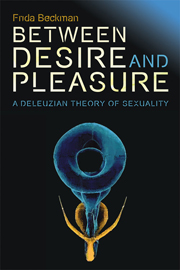Book contents
- Frontmatter
- Contents
- Preface
- Introduction: The Body without Orgasm
- 1 A Nonlinear History of Sexuality: Deleuze with Foucault
- 2 Psychoanalysis Unhinged: Deleuze with Lacan, Klein and Reich
- 3 Folding, Individuation and the Pleasurable Body
- 4 Orgasmic Feminism
- 5 Disabling Sex: Inventing a People who are Missing
- 6 Becoming-Animal and the Posthuman Orgasm
- 7 Capitalism and Sexuality
- Epilogue: Swedish Sin, or the Importance of Remaining Curious
- Bibliography
- Index
4 - Orgasmic Feminism
Published online by Cambridge University Press: 05 October 2013
- Frontmatter
- Contents
- Preface
- Introduction: The Body without Orgasm
- 1 A Nonlinear History of Sexuality: Deleuze with Foucault
- 2 Psychoanalysis Unhinged: Deleuze with Lacan, Klein and Reich
- 3 Folding, Individuation and the Pleasurable Body
- 4 Orgasmic Feminism
- 5 Disabling Sex: Inventing a People who are Missing
- 6 Becoming-Animal and the Posthuman Orgasm
- 7 Capitalism and Sexuality
- Epilogue: Swedish Sin, or the Importance of Remaining Curious
- Bibliography
- Index
Summary
Our person is a covered entrance to infinity
Choked with the tatters of tradition.
(‘O Hell’, Loy 1996: 71)Introduction
Positioned as secondary to male ejaculation, discouraged if clitoral, and seen as ‘signifying nothing’, the female orgasm has had a very different status in history than its male counterpart. On the one hand, a deeper understanding of the female orgasm has been overshadowed by its being subsumed as a subcategory of male sexuality, and on the other, the differences between how male and female sexual pleasure have been perceived and theorised are enormous. In both cases, it seems indefensible to disregard the deeply gendered politics of the orgasm, whether your aim is to defend its philosophical and political potential or reject it. Yet, neither Foucault nor Deleuze seem to take these differences seriously enough. Foucault's The History of Sexuality, Lesley Dean-Jones argues, is a history of male sexuality (Dean-Jones 1992: 77). Not least in the way in which he understands the historical use of pleasure and the orgasm as defined through a model of the ‘viral “ejaculatory schema”’ and the female act as a duplicate to this schema, Foucault fails to recognise the different politics as well as expressions of orgasm and ejaculation (Dean-Jones 1992: 54). At the same time, Deleuze and Guattari's demotion of pleasure and genitality, while intended to expand sexuality beyond the two sexes, makes them blind to the fact that their understanding of desire and sexuality fails to take into account the actual politics of sexual difference.
- Type
- Chapter
- Information
- Between Desire and PleasureA Deleuzian Theory of Sexuality, pp. 70 - 97Publisher: Edinburgh University PressPrint publication year: 2013



